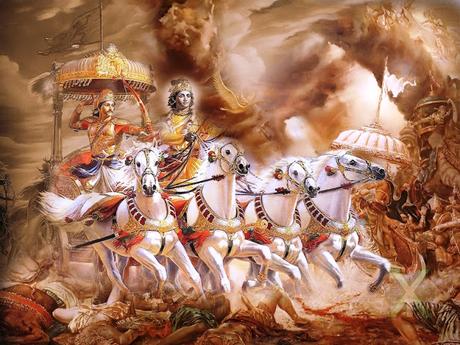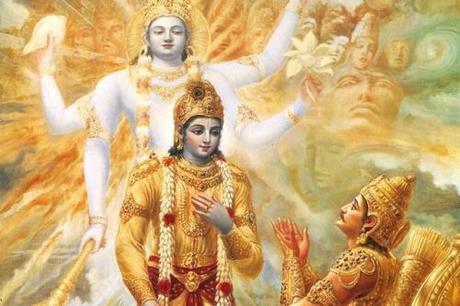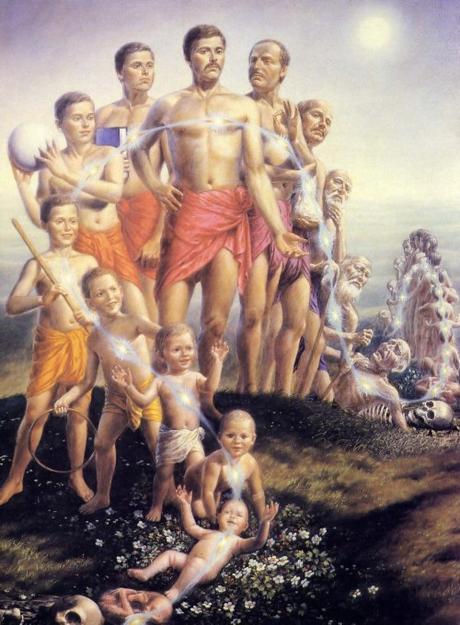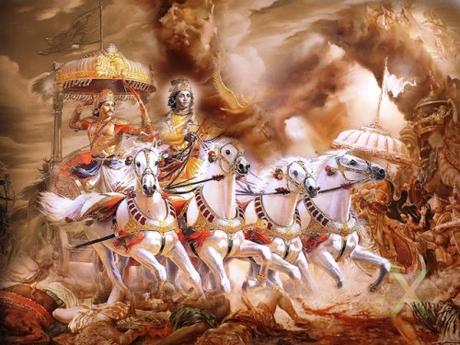
The Bhagavad Gita often referred to as the Gita, is a Hindu scripture that is part of the epic Mahabharata, dated back to the second century BCE . The scripture has enormous positive vibes which can lead you forward towards your spiritual journey. Srimad Bhagavad Gita comprises 18 chapters and has 700 Sanskrit shlokas or verses which unravel the philosophy of life. It is a compilation of dialogues between Pandava prince Arjuna and Lord Krishna during the Kurukshetra war. This holy book of the Hindus highlights the fundamental truths of life that have been inspiring the past, the present and will inspire the future of every human being.
There are many verses in Bhagavad Gita which I really like, and it is not easy to pick just one. Still, I am trying my best to summarize few shloka or verses from the holy book that takes us through the spiritual essence of the Bhagavad Gita in the most practical and systematic way.

Bhagavad Gita, Chapter 2, Verse 12
न त्वेवाहं जातु नासं न त्वं नेमे जनाधिपा |
न चैव न भविष्याम: सर्वे वयमत: परम् || 2.12||
na tvevāhaṁ jātu nāsaṁ na tvaṁ neme janādhipāḥ
na chaiva na bhaviṣhyāmaḥ sarve vayamataḥ param
This verse explains the non lasting existence of everyone (soul). Krishna says there was not any time in the past when he did not exist. He was there in present in the battle of Kurukshetra and will exist in the future also. Same is true for Arjuna and others kings too. Their eternal soul having neither birth or death, they should not be grieved for.
Bhagavad Gita, Chapter 2, Verse 14
मात्रास्पर्शास्तु कौन्तेय शीतोष्णसुखदु: खदा: |
आगमापायिनोऽनित्यास्तांस्तितिक्षस्व भारत || 2.14||
mātrā-sparśhās tu kaunteya śhītoṣhṇa-sukha-duḥkha-dāḥ
āgamāpāyino 'nityās tans-titikṣhasva bhārata
This shloka or verse from Bhagavad Gita communicates a very powerful and important message that nothing is permanent in this life.
Winters and summers are temporary in nature. Like whether changes with time, it come and go away. Similarly, pain and pleasure are impermanent and will come and go away.
Ups and downs, tough times and difficult situations will come and go away in life. Have patience, learn to tolerate them without being affected by them. Nothing is of permanent nature in this world. everything changes with time.
Bhagavad Gita, Chapter 2, Verse 20
न जायते म्रियते वा कदाचि
नायं भूत्वा भविता वा न भूय: |
अजो नित्य: शाश्वतोऽयं पुराणो
न हन्यते हन्यमाने शरीरे || 2.20||
na jāyate mriyate vā kadāchin
nāyaṁ bhūtvā bhavitā vā na bhūyaḥ
ajo nityaḥ śhāśhvato 'yaṁ purāṇo
na hanyate hanyamāne śharīre
Meaning : The soul is n either born, nor does it ever die; nor is it that having come to exist, It will ever cease to be. The soul is birth less, eternal, immortal and ageless; It is not destroyed when the body is destroyed.

"Fear of Death" is the biggest fear. Be fearless and live the life at the fullest. We all know that one day we are going to die. But the soul will never die. Death is solely the destruction of the materialistic physical body. Identify yourself as pure and peaceful eternal soul not as your materialistic physical body. The soul neither born nor die.
Bhagavad Gita, Chapter 2, Verse 22
वासांसि जीर्णानि यथा विहाय
नवानि गृह्णाति नरोऽपराणि |
तथा शरीराणि विहाय जीर्णा
न्यन्यानि संयाति नवानि देही ||2. 22||
vāsānsi jīrṇāni yathā vihāya
navāni gṛihṇāti naro 'parāṇi
tathā śharīrāṇi vihāya jīrṇānya
nyāni sanyāti navāni dehī
Meaning : As a person sheds worn-out garments and wears new ones, likewise, at the time of death, the soul casts off its worn-out body and enters a new one.
In this verse or shloka, Shree Krishna reiterates the concept of rebirth, comparing it to an everyday life activity. When cloths or garments become torn and useless after getting old, we discard them in favor of new ones, but in doing so we do not change ourselves. In the same manner, the soul remains unchanged, when it discards its worn-out body and takes birth in a new body elsewhere. Again the eternal and immortal form of the soul has been emphasized here.

Bhagavad Gita, Chapter 2, Verse 47
कर्मण्येवाधिकारस्ते मा फलेषु कदाचन |
मा कर्मफलहेतुर्भूर्मा ते सङ्गोऽस्त्वकर्मणि ||2. 47 ||
Meaning : You have a right to perform your prescribed duties, but you are not entitled to the fruits of your actions. Never consider yourself to be the cause of the results of your activities, nor be attached to inaction.
This is probably one of the most famous shlokas from the Bhagavad Gita. This emphasizes to be process oriented rather then result oriented. Do your duty in best possible manner and be detached from its outcome, do not get driven by the result, enjoy the journey of reaching there. Because if the end results does not turn around as per your expectations, pain is unavoidable.
Existence in the womb, birth, growth, procreation, diminution, and death. These are transformations of the human body, not of the self (soul). The self awareness that you are soul is one of the important step towards spiritual journey.
Bhagavad Gita, Chapter 2, Verse 70
आपूर्यमाणमचलप्रतिष्ठं
समुद्रमाप: प्रविशन्ति यद्वत् |
तद्वत्कामा यं प्रविशन्ति सर्वे
स शान्तिमाप्नोति न कामकामी ||2. 70||
āpūryamāṇam achala-pratiṣhṭhaṁ
samudram āpaḥ praviśhanti yadvat
tadvat kāmā yaṁ praviśhanti sarve
sa śhāntim āpnoti na kāma-kāmī
Meaning : Just as the ocean remains undisturbed by the incessant flow of waters from rivers merging into it, likewise the sage who is unmoved despite the flow of desirable objects all around him attains peace, and not the person who strives to satisfy desires.
A deep and large ocean has many streams of water entering it. No matter how many streams enter the ocean, regardless of how gently or how forcefully they enter it, the ocean always remains calm and undisturbed. Likewise individual of steady wisdom has all the - "thoughts, needs, expectations, desires" (rivers) flowed in the mind (ocean) , but he/she does not get affected and disturbed with them. He/she does not get impacted by any number of material objects or desires that he/she experiences.
Bhagavad Gita, Chapter 3, Verse 35
श्रेयान्स्वधर्मो विगुण: परधर्मात्स्वनुष्ठितात् |
स्वधर्मे निधनं श्रेय: परधर्मो भयावह: || 3.35||
śhreyān swa-dharmo viguṇaḥ para-dharmāt sv-anuṣhṭhitāt
swa-dharme nidhanaṁ śhreyaḥ para-dharmo bhayāvahaḥ
Lord Krishna says to us that it is better to perform our own prescribed duty even if it has some faults rather than performing someone else's duty to perfection.
Around 4000 - 5000 years back; what Lord Krishna said in the above verse is still relevant. On the similar lines there is a famous quote of Steve Jobs (co-founder of Apple), from his commencement speech to the graduates of Stanford University which goes like this - " Your time is limited, so don't waste it living someone else's life. Don't be trapped by dogma - which is living with the results of other people's thinking."
Life is short. Don't do precisely what others do. Be original. Have the courage to follow your intuition and dreams. Don't let others opinion affect your opinion. Don't waste precious time by doing things other people want you to do. When you're cognizant of the fact that time is short, you value it appropriately.
Bhagavad Gita, Chapter 3, Verse 42
इन्द्रियाणि पराण्याहुरिन्द्रियेभ्य: परं मन: |
मनसस्तु परा बुद्धिर्यो बुद्धे: परतस्तु स: || 3.42||
indriyāṇi parāṇyāhur indriyebhyaḥ paraṁ manaḥ
manasas tu parā buddhir yo buddheḥ paratas tu saḥ
Meaning : The senses are superior to the gross body, and superior to the senses is the mind. Beyond the mind is the intellect, and even beyond the intellect is the soul.
An inferior entity can be controlled by its superior entity. Here in the above verse or shloka Shree Krishna explains the gradation of superiority amongst the instruments God has provided to us. He describes that the body is made of gross matter; superior to it are the five knowledge-bearing senses (which grasp the perceptions of taste, touch, sight, smell, and sound); beyond the senses is the mind; superior to the mind is the intellect, with its ability to discriminate; but even beyond the intellect is the divine soul.
This knowledge of the sequence of superiority amongst the senses, mind, intellect, and soul, can now be used for rooting out lust, as explained in the final verse of chapter 3.
Bhagavad Gita, Chapter 16, Verse 21
त्रिविधं नरकस्येदं द्वारं नाशनमात्मन: |
काम: क्रोधस्तथा लोभस्तस्मादेतत्त्रयं त्यजेत् || 16.21||
tri-vidhaṁ narakasyedaṁ dvāraṁ nāśhanam ātmanaḥ
kāmaḥ krodhas tathā lobhas tasmād etat trayaṁ tyajet
Meaning : There are three gates leading to the hell of self-destruction for the soul-lust, , and greed. Therefore, all should abandon these three.
Together, lust, anger, and greed are the foundations from which the demoniac vice gets developed. These are the root cause of virtually every single problem in human life. They fester the mind and make it a suitable ground for all the vice to get triggered. So if anyone wants to avoid the self-destruction, he or she should ensure to stay away from these three.
These were my best verses or shlokas from Bhagavad Gita, which have bring remarkable transformation in my spiritual journey. Over to you now, we would like to know the verses or slokas which you like most and have made a significant impact in your life. Please feel free to share them in the comment section below.
If you have liked this article, please spread the wisdom at your favorite social networks.